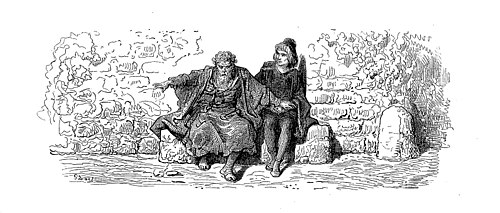
PREMIÈRE PARTIE
It is an ancient Mariner,
And he stoppeth one of three.
"By thy long grey beard and glittering eye,
"Now wherefore stopp’st thou me ?C’est un ancien marin ; trois jeunes gens passent, il en arrête un. — Par ta longue barbe grise et ton œil brillant, pourquoi m’arrêtes-tu ?
"The Bridegroom’s doors are opened wide,
"And I am next of kin ;
"The guests are met, the feast is set:
May’st hear the merry din."La porte du marié est toute grande ouverte, je suis son propre parent, les hôtes sont arrivés, la noce est prête : n’entends-tu pas son joyeux bruit ?
He holds him with his skinny hand,
"There was a ship," quoth he.
"Hold off! unhand me, grey-beard loon!"
Eftsoons his hand dropt he.Le vieux marin serre le bras du jeune homme de sa main décharnée : — Il y avait un vaisseau… dit-il. — Lâche-moi, ôte ta main, drôle à barbe grise ! » Et aussitôt la main tombe.
He holds him with his glittering eye—
The Wedding-Guest stood still,
And listens like a three years' child:
The Mariner hath his will.Le marin retient le jeune homme avec son œil brillant. Le garçon de noce demeure tranquille et écoute comme un enfant de trois ans : le marin a sa volonté.
The Wedding-Guest sat on a stone:
He cannot choose but hear;
And thus spake on that ancient man,
The bright-eyed Mariner.Le garçon de noce s’assit sur une pierre : il ne peut s’empêcher d’écouter ; et ainsi parla le vieil homme, le marin à l’œil brillant :
The ship was cheered, the harbour cleared,
Merrily did we drop
Below the kirk, below the hill,
Below the lighthouse top.— Le navire salué de cris avait franchi le port : gaiement nous laissâmes derrière nous l’église, la colline et la tour du fanal.
The Sun came up upon the left,
Out of the sea came he!
And he shone bright, and on the right
Went down into the sea.Le soleil parut à notre gauche, s’éleva de la mer, brilla, et vint à notre droite se coucher dans la mer.
Higher and higher every day,
Till over the mast at noon—
The Wedding-Guest here beat his breast,
For he heard the loud bassoon.De plus en plus haut, chaque jour, il monta dans le ciel, jusqu’à ce qu’il planât sur les mâts à l’heure de midi. Ici le garçon de noce se frappe la poitrine, car il entend les profonds accords du basson.
The bride hath paced into the hall,
Red as a rose is she;
Nodding their heads before her goes
The merry minstrelsy.La mariée est entrée dans la salle du banquet, vermeille comme une rose, et, tout en remuant la tête au son des instruments, la bande joyeuse des musiciens marche devant elle.
Yet he cannot choose but hear;
And thus spake on that ancient man,
The bright-eyed Mariner.Le garçon de noce se frappe la poitrine ; mais il ne peut s’empêcher d’écouter, et ainsi continua le vieil homme, le marin à l’œil brillant.

